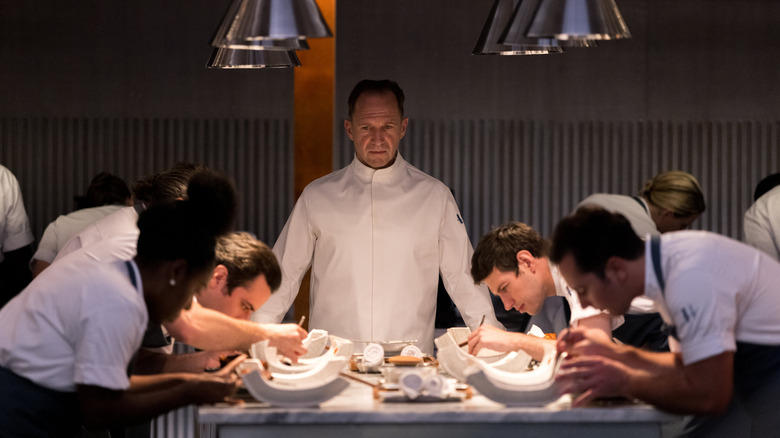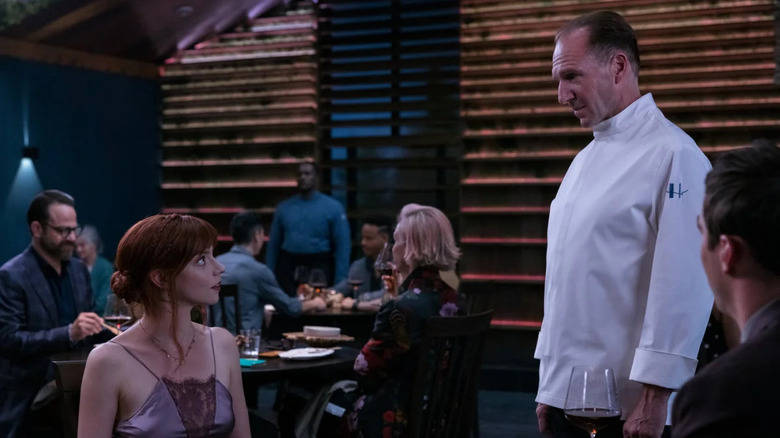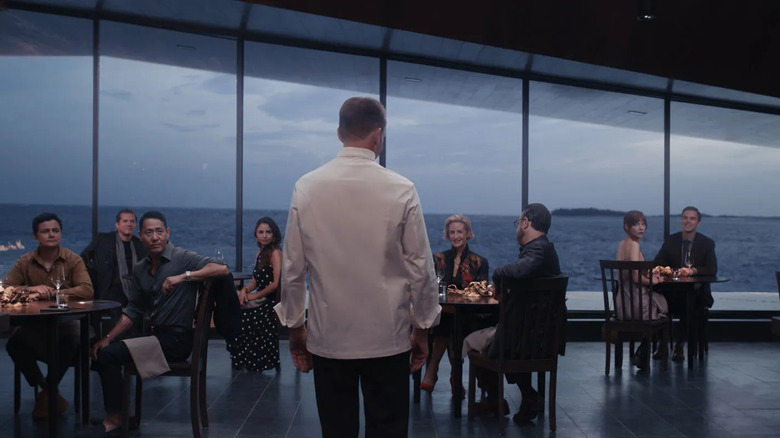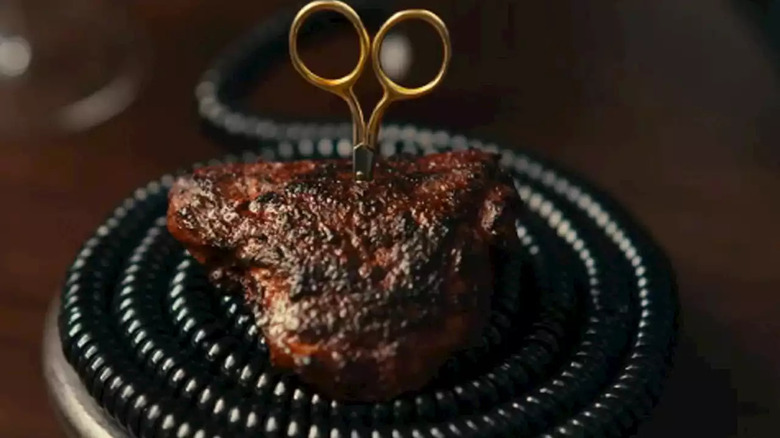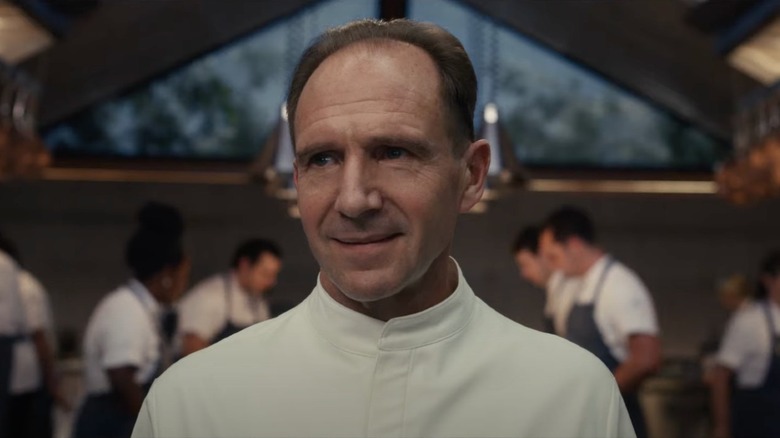How The Onion Helped Screenwriters Seth Reiss And Will Tracy Craft 'The Menu' [Exclusive Interview]
"The Menu" is a crafty, sly, and mean-spirited delight. The dark comedy has loads of fun keeping both its characters and audience on their toes. The organic twists and turns are surprising but inevitable in the hands of screenwriters Seth Reiss and Will Tracy — the duo penned a true feast of a thriller.
Reiss and Tracy previously worked together on HBO's "Succession," not to mention separate gigs for Seth Meyers and John Oliver. Naturally, the pair's rock strong comedic timing rings loud and clear in "The Menu." Reiss and Tracy once contributed to The Onion, and in an interview with /Film, they explained how that experience helped them craft their original thriller.
This interview has been lightly edited for clarity and brevity.
'Every scene has to have an engine to it'
How heavily outlined was this movie?
Tracy: First series of meetings, usually at my apartment, we'd have dinner and then we'd talk through the story and the idea. Usually one of us, usually me, would be keeping notes. And then we'd send the notes to each other. And then we would just keep talking over a series of nights, over a series of weeks. Basically, we would do it until we get to the point where, all right, I'm really raring to write now. I'm feeling excited to write. I'm not feeling like there's anything blocking us. I want to get in there. We could spend more time talking it out, but we're kind of ready to go.
Reiss: I feel the most disgusting writing is when I'm starting a scene and I don't know why I'm starting it. I think the outline that we created made us feel that we were never going to feel like we didn't know where we were headed.
Tracy: Or what the premise of a scene was because every scene has to have an engine to it.
Reiss: There was enough space in the outline to fill in, that was really fun. The way we kind of did it after we talked and outlined and then I would go off, write 15 pages, send it to Will. Will would do a pass on those 15 pages, send it back to me. It was really fun because there was some space to fill-in in those outlines. It was really fun to surprise Will with something, and Will would surprise me with things that were not in the outline. And that was always kind of a delight throughout the process.
Tracy: You want to see what the other person does because we're not the type of writing team that sits in a room and writes the script together. We talk about the story and then we really want to be surprised by the other person's pages and what they said.
[This next question and answer contains spoilers]
What were some of the pleasant surprises in the process?
Reiss: I actually don't think this was in the outline, pretty sure it wasn't. When, well this is a spoiler, but Tyler knew all along. I don't think that was in the original outline. I think that was part of Will's section and I think he just knew, I don't know, to put something in there.
Tracy: I think you might be right. There were few things like that were kind of more story beats that... It wasn't some great thing that I landed on, it was probably just looking at the outline. Sometimes it's sort of, oh, it's actually quite obvious and if we had met one more night, we would've gotten there. It feels like, well, let's fill that in.
Reiss: I remember one thing that wasn't in [...] There are certain elements in the movie that sort of feel like they have to happen because of the genre in a certain sense. When going to the chef's house, it wasn't in the outline that the chef's house looked exactly like the restaurant. Basically, he just slept in a sort of facsimile of the restaurant. That was not in the outline, but I just thought, well, there's got to be a more interesting way to do this. What does the inside of the house look like?
Tracy: What would a guy like that... What is his home? What does he want it to look like?
Reiss: His home is the restaurant.
'If they were to have the next day, does the next day really need them?'
You've both had experiences working in comedy for John Oliver and Seth Meyers' shows. Having all that experience and time crafting jokes, how does it help you write a dark comedy like "The Menu"?
Tracy: Yeah, I never thought of it, but I think you're right. The amount of jokes that you have to write, and many of them, even while you're writing them, you're like, "This is bad," but you have to do it.
Reiss: I would say writing for Seth, even though he would probably say, "I don't see this in your writing," I mean there is an element of TV writing that has to be a little bit more economical. And so, I have that in my mind. Whether or not I execute it or not, I'm not sure. Also, I think Will and I writing for The Onion together, I think this is a very Onion-y type of movie in terms of how specific the world is that we're creating, the language that goes into that, and then also how sad everyone is.
Like The Onion, you're both punching up in this movie.
Reiss: Yes, exactly.
Seth, you mentioned earlier the most uncomfortable feeling when writing is when you start a scene. When you have an ensemble this colorful and large, does that make it easier or more challenging, knowing when and where to start a scene?
Tracy: It is always helpful to have another table to swing to if we feel as though conversationally, two characters have reached a dead end or we want to keep the power to drive or we don't want the conversation to go all the way over here because that's for later in the movie. So, it helps to have somewhere else to go.
The trick becomes juggling all those tables and remembering, okay, where is each table at emotionally? Where have we progressed their story? If you separate them all out, is there a clear arc for each table? Which I think we got to, but in early drafts, I wouldn't say that was fully there yet. I think some of the tables were, oh, we came up with maybe interesting ideas for characters, but they didn't really have a story that went somewhere. I think we landed it with all of those tables that do have a story.
Reiss: Yeah, I think so. They all come to some level of acceptance of the night. I think they are all ultimately persuaded by the chef's argument that perhaps if they were to have the next day, does the next day really need them? And so, getting everyone to that point, I think is the arc of all the diners there. And then they all have their own little things that they're dealing with, but that's their overarching arcs.
Tracy: And we tried to be subtle with this. I don't think it was the original intention. I think we were just trying to get an interesting mix of who are the type of people, when you go to a restaurant like this, who do you usually see? It was usually an older couple who didn't say one word to each other the entire night. Super foodie guy. There's always a table full of guys at a business dinner and it's bro-y and kind of s*****. So it started with that, but then we eventually got to the point of, oh, every table in that restaurant has some sort of stake in the restaurant itself as an idea or as a business.
The tech guys, they're co-owners of the restaurant. They have some stake, actual financial stake in the restaurant. The critic has her reputation at stake as someone who decides whether these places are good or not. Tyler, his whole identity as a foodie is wrapped around this restaurant. Although it may seem like they have nothing to do with each other, they're all in some way connected to the restaurant as an idea. Even that older married couple, they're connected to the idea of this is the place to go if you have the kind of money we have. It says something about our status. And so, we're going to eat here 15 times in a year, even though we won't remember a single thing we ate.
'Good f****** luck if you're trying to steal my recipes'
Obviously, Ralph Fiennes has such a distinct voice. What was the Chef's voice like on the page, though?
Reiss: Ralph Fiennes'.
Tracy: Ralph Fiennes'. We were essentially writing it for him at a certain point, thinking hopefully, we can get him. Even before he was fully in, there had been interest from him. And so, then we really started writing it towards him. He has a surprising jauntiness.
Reiss: Surprising jauntiness that the movie is dark, but it never ceases, at least I hope from the viewer, it never ceases being funny. It never ceases being funny because of Ralph. He's light on his feet.
Tracy: He doesn't seem like he's playing heavy. He can be scary in a way, but he can also be quite charming and lighter than you expect in his tone. I mean, the guy, it's the same actor playing the guy in "Grand Budapest Hotel" as the guy in "Schindler's List." In some way, we wanted him to be bringing both of those skill sets.
Reiss: There's a difference between mean and mischievous. He's more mischievous, and I think being mischievous is funnier.
It's a very sad character.
Reiss: Oh, it's extremely sad. Extremely sad. I mean, I love talking about the sadness of these people. Ralph is so sad. Tyler is not only the most psychotic person in the restaurant by far, but I think also the saddest. What his life is like when he's just alone has got to be brutally sad.
Tracy: Chef is at least enough of a human being to know, yeah, the only thing that matters to me is this place, but he at least seems to know it's awful that it's taken over his life.
I appreciated, by the way, one of the villainous characteristics in this movie is a character telling someone not to touch their food until they photograph it first.
Tracy: There's such an art to photographing food. And most people, they don't do it right. They kind of do it from chest level at an angle and usually not making sure that the flash is on or off, and it makes for a very unflattering photo. I think a lot of restaurants, that's part of the reason why they don't like it because you're not going to photograph it right. You're not going to do it with perfect lighting. Usually, it's better to do it right from on top, you're looking directly down, that's the most flattering way to photograph food.
I remember hearing one story also about a chef who should go unnamed because it's not a flattering story, but someone in one of his restaurants was taking photographs of the food and the chef brought him aside and said, "Can I talk to you?" Brought him aside and brought him back to the kitchen and said, "Are you trying to steal my recipes?" And the guy thought he was joking. He said, "No, are you trying steal? Because you can't do what I can do. Even if you tried to do it, you couldn't do it. So good f****** luck if you're trying to steal my recipes." The guy was just thinking, I'm not trying to steal your recipes.
It's a really tough world, a very competitive world. He finally made it to the top as this chef and he probably had his recipe stolen before and he probably had competed against people who weren't as good as him but were climbing up the ladder faster, and it made him very, very paranoid. Now, when he sees a customer photograph his food, he thinks like, you're f****** trying to steal my recipes.
It's a very tough life because your proprietary thing is so... Technically, yes, someone could cook your food if they had the recipe. It's also so ephemeral, you make it and someone eats it and it's gone. And so, it's not the same thing as the filmmaker makes their film and there's no recipe for a film and it exists forever. So it's a hard way to be an artist.
'We love him and we also think he's full of s***'
Will, hearing you tell that story about the chef, it's not surprising how much empathy you both clearly have for Chef and process.
Reiss: Oh yeah. I mean, we think Chef Slowik is a genius. We love him and we also think he's full of s***. I think those two things can exist and also hopefully for the audience, make it an interesting watch because I think in some ways they agree with his evening and why he's doing what he's doing, but then ultimately I think people feel, "Oh, stop whining. You've chosen to do this with your life. You need to accept that this is what your vocation is like I've accepted what my vocation is. Calm down." I think if people feel both of those things towards Chef, that Will and I have done a good job.
Did you both do a deep dive into the culinary world? What pieces of information really helped you?
Tracy: I'm probably more of a foodie than Seth. I wasn't ever thinking I would write a movie or co-write a movie about this, but it was just sort of my secret obsession. During my lunch hour at work, I would watch YouTube videos of famous chefs and I knew all the lists and where everything ranked on all the world's 50 best. And this was the thing to distract myself from work and to relax, I would follow this world.
Like all self-punishing writers, I made my joy into my homework, so now I don't take as much joy in it anymore. I just had a lot of that s*** in my head. Then write what you know, right? And then Seth was just such a perfect match in terms of character and story and what he likes to write about emotionally that it just really worked.
Reiss: Yeah, I'm very much obsessed with why artists do what they do, their obsession with their audience, their need for their audience, wanting to feel like what they're doing is egoless but ultimately it is not being egoless, no matter what. It's an unwinnable fight. There's no world where Chef Slowik is going to make his menu in a kitchen by himself, eat it, and go to bed.
"The Menu" is now playing in theaters.
